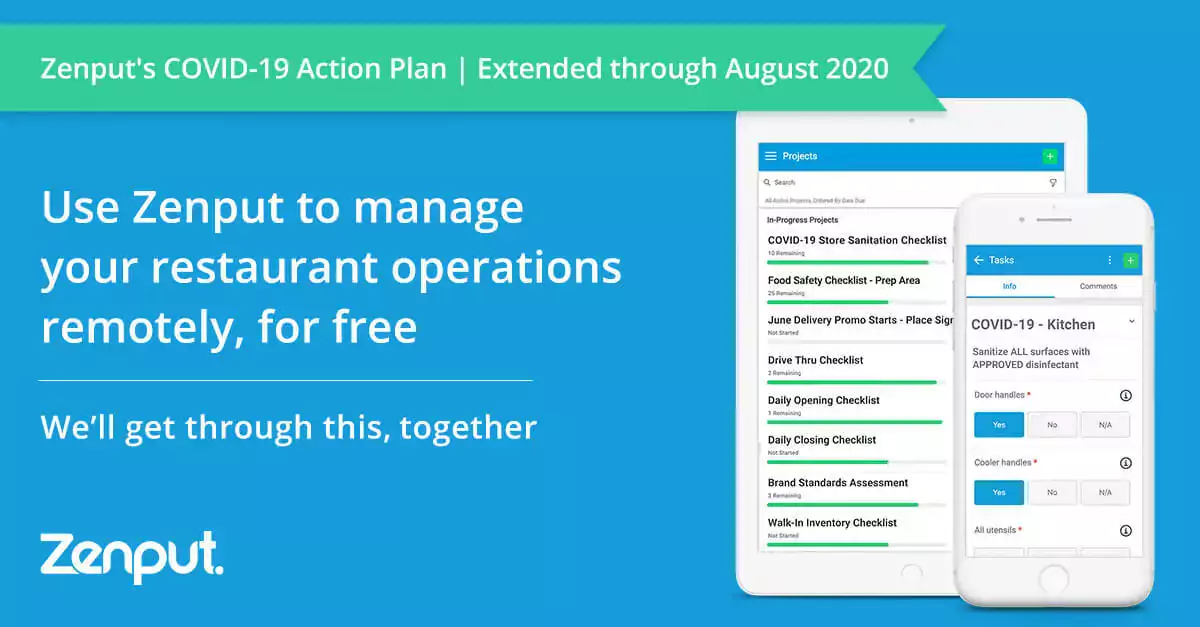As the foodservice industry responds to the unprecedented global coronavirus outbreak, operators are doing everything they can to help keep staff and customers safe. This means operations teams are having to quickly deploy necessary changes to people management and staffing, revise many of their operating procedures and introduce new ones, and figure out how to quickly roll-out and ensure compliance with all of them, which becomes even more challenging as field teams are forced to limit travel.
We outlined some of the strategies the brands that we support are deploying in this recent Zenput blog post. To continue operations, many are having to quickly transform their entire mode of operation to delivery and take-out, which further requires rethinking SOPs, as captured in our interview with Farmers Restaurant Group.
With so many questions to address in this uncharted territory, as a community, we’re all looking for expert guidance to help us make the best decisions and plan for what’s coming next. Towards that end, we had a chance to spend time with Dr. Hal King, Founder & CEO of Public Health Innovations, with whom the Zenput team has closely partnered.
Dr. King is a public health professional who has worked in the investigation of foodborne and other disease outbreaks (Centers for Disease Control and Prevention, U. S. Public Health Service), performed federally funded research on the causation and prevention of infectious diseases (Emory University School of Medicine, Division of Infectious Diseases), and is the recipient of the 2018 NSF International Food Safety Leadership and Innovation Award (see Hal’s full bio below).
Hal, thanks for taking the time to share your thoughts with us.
Hal: First let me say THANK YOU to all the leaders and employees of the thousands of retail foodservice and sales businesses working to protect their employees and customers, provide food to the public as critical infrastructure entities, and keep their businesses open now and for us all in the future. I also want to thank Zenput for offering their mobile platform for free to help the industry quickly implement their COVID-19 plans in this “new normal” for retail foodservice and sales operations.
The new normal in the retail foodservice industry is to protect the public’s health from non foodborne infectious diseases in the United States. Of course this industry has always been responsible to the public’s health via providing safe food, and this has defined regulations (e.g., the FDA Food Code and FSMA rules in the United States) to which operators must show compliance; as their enforcement occurs at the federal, state, and local levels. But now, especially under State of Emergency laws enacted by many states, the industry must also demonstrate they are in compliance with the controls necessary to prevent spread of pandemic coronavirus between and amongst employees and customers.
How well have food safety regulations prepared operators to deal with COVID-19?
To make it tangible, I’ll give you an example. Up to 60% of all illnesses and outbreaks each year in restaurants in the United States can be traced to the foodborne disease norovirus. Norovirus is difficult to control, it comes into a restaurant via employees, is persistent – surviving on surfaces for weeks, is highly contagious to customers via cross-contamination of food, and is highly contagious to other employees, even in very small amounts. Now restaurants must also control a different virus (pandemic coronavirus) that is not a foodborne pathogen, but is persistent on surfaces and highly contagious to employees and customers.
The good news is that the two most critical methods of prevention for both of these diseases in restaurants are the same; (1) the means to reduce the risk of employees working when sick, and (2), the means to ensure virus mitigation using personal hygiene and environmental contamination controls (for when employees with asymptomatic illness work).
I’m sure employee wellness is top of mind for everyone. What is your guidance there?
First, the foodservice business must implement a screening process that will enable each employee to be screened for signs and symptoms of pandemic coronavirus before each shift. Likewise, the business should also screen employees for signs and symptoms for norovirus (and other contagious foodborne illnesses that employees can carry) to include fever, diarrhea, and vomiting.
This screening process must also include criteria for when to exclude employees and define and document when they can be allowed to return to work.
Because the pandemic and what we know about the transmission and disease caused by the COVID19 virus changes over time, it is always important to first check the most current guidance on pandemic coronavirus signs and symptoms at the CDC resources page for businesses.
What about virus mitigation? What is your guidance there?
The foodservice industry has always been required to establish controls to prevent cross contamination of foods including from norovirus, using employee personal hygiene (hand washing, proper glove use) and environmental contamination (cleaning and sanitation) controls. Now the industry must also focus on cleaning and disinfection of high touch environmental surfaces that will eliminate transmission of pandemic coronavirus as well.
Again, the good news here for the public health is, because both viruses are transmitted from hands to high touch environmental surfaces, implementing methods to clean and disinfect high touch surfaces will also be beneficial to reducing the risk of norovirus foodborne disease outbreaks as well as pandemic coronavirus spread.
Remember that pandemic coronavirus is not a foodborne disease, and not likely transmitted via food. However, many of the same methods and systems that are used to prevent foodborne illnesses will also be effective in prevention of pandemic coronavirus. The most effective means to prevent foodborne illnesses in foodservice establishment is by deployment of Food Safety Management Systems (FSMS) that document the methods of controls and provide regular monitoring and defined corrective actions to ensure controls are always in place.
Ok, let’s now allow ourselves to look forward. What are some things operators need to start building into their plans and strategies when we all climb back to “business as usual”, even if we realistically assume that may take a while?
Foodservice operators should begin building their Food Safety Management Systems (FSMS) to include documentation and deployment of these two controls (employee wellness screening and virus mitigation), and use a monitoring process (e.g., I recommend digital Process HACCP-based FSMS as they enable real-time monitoring and corrective actions to ensure controls are active during each shift). If the foodservice business is not currently using FSMS, now is the time to start.
They can start with these controls first as the basis of the FSMS (wellness screening and virus mitigation controls) discussed today as both deal with these dual threats of norovirus (and other foodborne diseases) and coronavirus, and then move to designing their full Process HACCP FSMS – which will help provide the systems that they can use going forward to prevent most all foodborne diseases.
How should operators approach making progress there?
Work with the experts that can help design their FSMS, even if they start only with these two controls during the coronavirus pandemic.
When customers are ready to return to the dining room, what is the criteria for building customer confidence?
I believe customers will want to see evidence of safety both from public health authorities (e.g., health inspections of foodservice establishments after the high disease transmission rates subside) and demonstrated (i.e., experienced by the customer) by the business. For example, customers will want to know and observe how the foodservice business ensures employee wellness and virus mitigation via documented procedures, evidence of compliance beyond health inspections, and seeing employees clean and disinfect the dining areas.
Finally, rising way up. Are there any words of guidance you’d have for operators reading this article?
All of us in this industry want to see it safely return to business, and all of us want to be free to go to restaurants again with family and friends. This pandemic coronavirus is personal to all of us, and must be stopped by all of us working for the benefit of the public health. However, every year there are over 3,000 deaths, and many more illnesses including life changing health impacts (especially in children) due to foodborne diseases. We now have the opportunity to work together to address both, and I would like to see that after the pandemic is defeated, we can prevent all these foodborne diseases as well.
About Dr. Hal King:
Dr. Hal King is the Founder/CEO of Public Health Innovations, a thought-leadership and consulting services business, a Partner in Active Food Safety, a food safety management systems design company, and an Associate Professor of Public Health at the University of Georgia College of Public Health. Dr. King is a public health professional who has worked in the investigation of foodborne and other disease outbreaks (Centers for Disease Control and Prevention, U. S. Public Health Service), performed federally funded research on the causation and prevention of infectious diseases (Emory University School of Medicine, Division of Infectious Diseases), and worked in the prevention of intentional adulteration of foods in the United States and for Army force health (U.S. Army Reserves Consequence Management Unit). He is formally the Director of Food and Product Safety at Chick-fil-A Inc. (a national restaurant chain with 2,000 restaurants and over $10 billion in annual sales) where he designed and led Chick-fil-A’s food safety management program for 11 years. Dr. King is the author of the book, Food Safety Management: Implementing a Food Safety Program in a Food Retail Business (Springer) and lead author of the book, Hazard Analysis and Risk-Based Preventive Controls Improving Food Safety in Human Food Manufacturing for Food Businesses (Elsevier). Dr. King is presently writing a third book on how to use food safety management systems (FSMS) to prevent foodborne disease illnesses and outbreaks in restaurants using Process HACCP-based FSMS (Springer, 2020). Dr. King is the recipient of the 2018 NSF International Food Safety Leadership and Innovation Award.
Subscribe to our blog
You are now subscribed!


